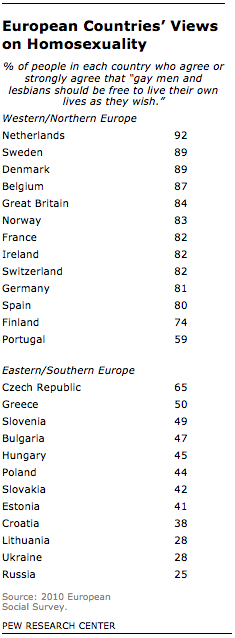Recent developments in Croatia and Scotland highlight a stark divide between Eastern and Western Europe on the topic of same-sex marriage. While several nations in Western Europe have made it legal for gay and lesbian couples to wed with broad public support, other countries across the continent are overwhelmingly opposed to such laws.
Voters in Croatia approved a constitutional amendment on Dec. 1 that defines marriage as a “union of man and woman,” with 66% of votes cast favoring the change. At the same time, Scotland’s government appears to be on track to join neighbors England and Wales, which legalized same-sex marriage earlier this year.
A May 2013 online poll conducted by the French Institute of Public Opinion (IFOP) found majorities in several Western European countries in favor of marriage and adoption rights for same-sex couples, with those in the Netherlands (85%), Germany (74%), Belgium and Spain (71% each) expressing the most support. In Scotland, the percentage of people who favor same-sex marriage has increased from 41% in 2002 t0 61% in 2010, according to the latest Scottish Social Attitudes Survey.
Meanwhile, Croatians are not the only Eastern Europeans who oppose same-sex marriage. A poll taken earlier this year by the Levada Public Opinion Center found that 85% of Russian adults say they are opposed to allowing gay and lesbian couples to wed.

Relatively few in Poland (21%) and Hungary (30%) express support for same-sex marriage, according to an online Reuters/Ipsos poll, which also asked about views on legal recognition other than marriage. In both countries, significant percentages support some kind of legal recognition for same-sex couples (39% in Poland and 21% in Hungary), while 24% of Poles and 26% of Hungarians oppose same-sex marriage or any kind of legal same-sex unions.
More than half of the world’s countries that allow same-sex marriage are in Western or Northern Europe – including the Netherlands and Belgium, which were the first two countries to approve such legislation, in 2000 and 2003, respectively.
The cross-continental divide has led to talk about whether the Netherlands might grant asylum to gay and lesbian Russians seeking to escape that country’s anti-homosexual “propaganda” law – a measure passed this past June by a 436-0 vote in the Russian parliament.
The European Social Survey has not asked about same-sex marriage, but in 2010 it included a question about attitudes toward homosexuals. In several Western European countries, including France, Germany, Spain and Great Britain, more than 80% of respondents agree that “gay men and lesbians should be free to live their own lives as they wish.” In Croatia, Lithuania, Ukraine and Russia, however, fewer than 40% agree with that statement.
